
The Romani Holocaust was the planned effort by Nazi Germany and its World War II allies and collaborators to commit ethnic cleansing and eventually genocide against European Roma and Sinti peoples during the Holocaust era.
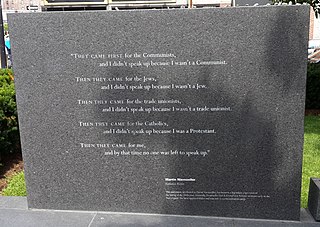
"First they came ..." is the poetic form of a 1946 post-war confessional prose by the German Lutheran pastor Martin Niemöller (1892–1984). It is about the silence of German intellectuals and clergy—including, by his own admission, Niemöller himself—following the Nazis' rise to power and subsequent incremental purging of their chosen targets, group after group. Many variations and adaptations in the spirit of the original have been published in the English language. It deals with themes of persecution, guilt, repentance, solidarity, and personal responsibility.

The Alberta Act, effective September 1, 1905, was the act of the Parliament of Canada that created the province of Alberta. The act is similar in nature to the Saskatchewan Act, which established the province of Saskatchewan at the same time. Like the Saskatchewan Act, the Alberta Act was controversial because it allowed the Government of Canada to maintain control of all of Alberta's natural resources and public lands. Alberta did not win control of these resources until the passage of the Natural Resources Acts in 1930.

Yom HaZikaron laShoah ve-laG'vurah, known colloquially in Israel and abroad as Yom HaShoah and in English as Holocaust Remembrance Day, or Holocaust Day, is observed as Israel's day of commemoration for the approximately six million Jews murdered in the Holocaust by Nazi Germany and its collaborators, and for the Jewish resistance in that period. In Israel, it is a national memorial day. The first official commemorations took place in 1951, and the observance of the day was anchored in a law passed by the Knesset in 1959. It is held on the 27th of Nisan, unless the 27th would be adjacent to the Jewish Sabbath, in which case the date is shifted by a day.

The United States Holocaust Memorial Museum (USHMM) is the United States' official memorial to the Holocaust. Adjacent to the National Mall in Washington, D.C., the USHMM provides for the documentation, study, and interpretation of Holocaust history. It is dedicated to helping leaders and citizens of the world confront hatred, prevent genocide, promote human dignity, and strengthen democracy.
A Holocaust memorial day or Holocaust remembrance day is an annual observance to commemorate the victims of the Holocaust, the genocide of six million Jews and of millions of other Holocaust victims by Nazi Germany and its collaborators. Many countries, primarily in Europe, have designated national dates of commemoration. In 2005, the United Nations instituted an international observance, International Holocaust Remembrance Day.
Ronald Gordon "Ron" Stevens was a Canadian politician. He was a member of the Legislative Assembly of Alberta representing the constituency of Calgary-Glenmore as a Progressive Conservative until his resignation on May 15, 2009. He was subsequently appointed a Judge of the Court of Queen's Bench of Alberta on May 20, 2009, by the government of Canada.
The Gathering of Israel, or the Ingathering of the Jewish diaspora, is the biblical promise of Deuteronomy 30:1–5, made by Moses to the Israelites prior to their entry into the Land of Israel.

Tim Uppal is a Canadian politician, banker, and radio host who is the member for Edmonton Mill Woods in the Parliament of Canada. He served as the Conservative Member of Parliament for Edmonton—Sherwood Park from 2008 to 2015. On July 15, 2013, Uppal was moved from Minister of State for Democratic Reform to the portfolio of Minister of State (Multiculturalism).

Between 1941 and 1945, the government of Nazi Germany perpetrated the Holocaust: a large-scale industrialised genocide in which approximately six million Jews were systematically murdered throughout German-occupied Europe. Since World War II, several countries have criminalised Holocaust denial—the assertion by antisemites that the genocide was fabricated or has been exaggerated. Currently, 17 European countries, along with Israel and Canada, have laws in place that cover Holocaust denial as a punishable offence. Many countries also have broader laws that criminalise genocide denial as a whole, including that of the Holocaust. Among the countries that have banned Holocaust denial, Austria, the Czech Republic, France, Germany, Hungary, Israel, Poland, Romania, Russia and Ukraine have also banned Nazi symbols. Additionally, any expression of genocide justification is also a criminal offence in several countries, as is any attempt to portray Nazism in a positive light.

The Auschwitz-Birkenau State Museum is a museum on the site of the Nazi German Auschwitz concentration camp in Oświęcim, Poland.

At approximately 12:50 p.m. on June 10, 2009, 88-year-old James Wenneker von Brunn entered the United States Holocaust Memorial Museum in Washington, D.C., with a slide-action rifle and fatally shot Museum Special Police Officer Stephen Tyrone Johns. Other special police officers returned fire, wounding von Brunn, who was apprehended.
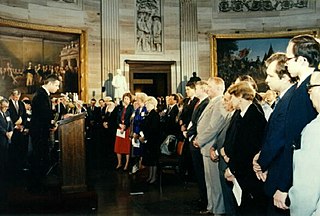
The Days of Remembrance of the Victims of the Holocaust (DRVH) is an annual eight-day period designated by the United States Congress for civic commemorations and special educational programs that help citizens remember and draw lessons from the Holocaust. The annual DRVH period normally begins on the Sunday before the Israeli observance of Yom HaShoah, Holocaust Memorial Day, and continues through the following Sunday, usually in April or May. A National Civic Commemoration is held in Washington, D.C., with state, city, and local ceremonies and programs held in most of the fifty states, and on U.S. military ships and stations around the world. The United States Holocaust Memorial Museum designates a theme for each year's programs, and provides materials to help support remembrance efforts.
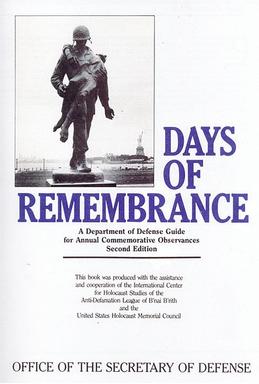
Liberation is a bronze Holocaust memorial created by the sculptor Nathan Rapoport, located in Liberty State Park in Jersey City, in Hudson County, New Jersey, United States. Officially dedicated on May 30, 1985, the monument portrays an American soldier, carrying the body of a Holocaust survivor out of a Nazi concentration camp.
The Alberta Ministry of Arts, Culture and Status of Women, commonly called Alberta Culture, is the Government of Alberta department responsible for the province's cultural industries, arts, and heritage, as well as the promotion of women's rights.
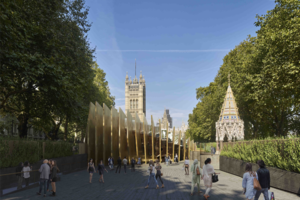
A UK Holocaust Memorial and learning centre was first proposed in 2015 to preserve the testimony of British Holocaust survivors and concentration camp liberators and to honour Jewish and other victims of attempted extermination by Nazi Germany, including Gypsies and disabled people.
The Act on the Institute of National Remembrance – Commission for the Prosecution of Crimes against the Polish Nation is a 1998 Polish law that created the Institute of National Remembrance. This memory law was amended twice, in 2007 and 2018.
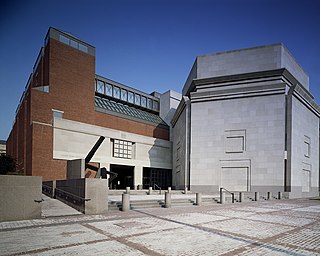
A neutral state, the United States entered the war on the Allied side in December 1941. The American government first became aware of the Holocaust in German-occupied Europe in 1942 and 1943. Following a report on the failure to assist the Jewish people by the Department of State, the War Refugee Board was created in 1944 to assist refugees from the Nazis. As one of the most powerful Allied states, the United States played a major role in the military defeat of Nazi Germany and the subsequent Nuremberg trials. The Holocaust saw increased awareness in the 1970s that instilled its prominence in the collective memory of the American people continuing to the present day. The United States has been criticized for taking insufficient action in response to the Jewish refugee crisis in the 1930s and the Holocaust during World War II.












